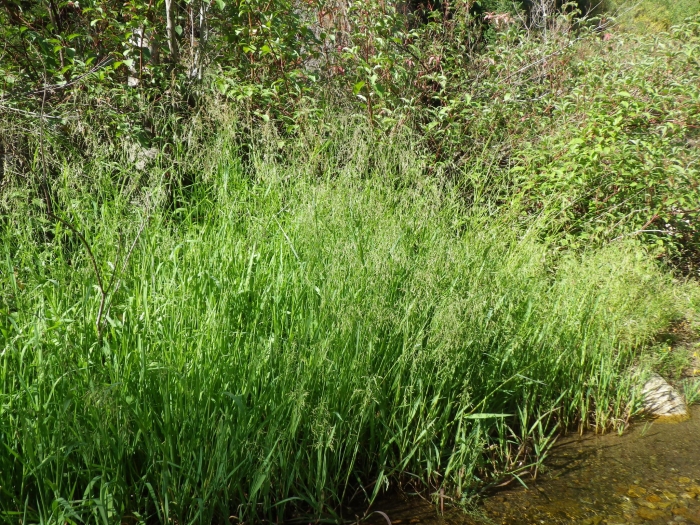Pale False Mannagrass
(Torreyochloa pallida)
Pale False Mannagrass (Torreyochloa pallida)
/
/

© Matt Lavin
CC BY 4.0
Image By:
© Matt Lavin
Recorded By:
Copyright:
CC BY 4.0
Copyright Notice:
Photo by: © Matt Lavin | License Type: CC BY 4.0 | License URL: http://creativecommons.org/licenses/by/4.0/ | Uploader: mattlavin | Publisher: iNaturalist |

























Estimated Native Range
Summary
Torreyochloa pallida, commonly known as Pale False Mannagrass or Weak Manna Grass, is a rhizomatous perennial grass native to North America, particularly found in wetland habitats such as marshes, fens, wet meadows, and along the edges of rivers and lakes. It is more commonly found in the northeastern United States and adjacent parts of Canada, as well as in the Pacific Northwest. This grass typically produces thick, erect to decumbent stems that can exceed 3 feet in length, and it thrives in moist, nutrient-rich soils.
Pale False Mannagrass is valued for its ability to stabilize soil and provide habitat for wildlife in wetland restoration projects. It is not typically used in ornamental gardening due to its preference for wet conditions and its relatively inconspicuous appearance. The inflorescence is a branching panicle with compressed spikelets containing up to 8 florets each, which are not particularly showy but can add texture to naturalistic plantings. In cultivation, it requires consistently moist to wet soil conditions and can tolerate partial shade, although it grows best in full sun. It is not known for any significant disease or pest issues, but its habitat requirements must be met for successful growth.CC BY-SA 4.0
Pale False Mannagrass is valued for its ability to stabilize soil and provide habitat for wildlife in wetland restoration projects. It is not typically used in ornamental gardening due to its preference for wet conditions and its relatively inconspicuous appearance. The inflorescence is a branching panicle with compressed spikelets containing up to 8 florets each, which are not particularly showy but can add texture to naturalistic plantings. In cultivation, it requires consistently moist to wet soil conditions and can tolerate partial shade, although it grows best in full sun. It is not known for any significant disease or pest issues, but its habitat requirements must be met for successful growth.CC BY-SA 4.0
Plant Description
- Plant Type: Grass
- Height: 1-3 feet
- Width: 1-2 feet
- Growth Rate: Moderate
- Flower Color: N/A
- Flowering Season: Summer
- Leaf Retention: Deciduous
Growth Requirements
- Sun: Full Sun, Part Shade
- Water: High, Aquatic
- Drainage: Slow, Standing
Common Uses
Bird Garden, Low Maintenance, Water Garden
Natural Habitat
Native to marshes, fens, wet meadows, and along the edges of rivers and lakes in the northeastern United States, adjacent parts of Canada, and the Pacific Northwest
Other Names
Common Names: Pale False Mannagrass, 좀미꾸리광이, Pale Mannagrass
Scientific Names: , Torreyochloa pallida, Glyceria pallida, Glyceria pallida var. pallida, Panicularia pallida, Poa dentata, Puccinellia pallida, Puccinellia pallida, Puccinellia pallida subsp. pallida, Triodia pallida
GBIF Accepted Name: